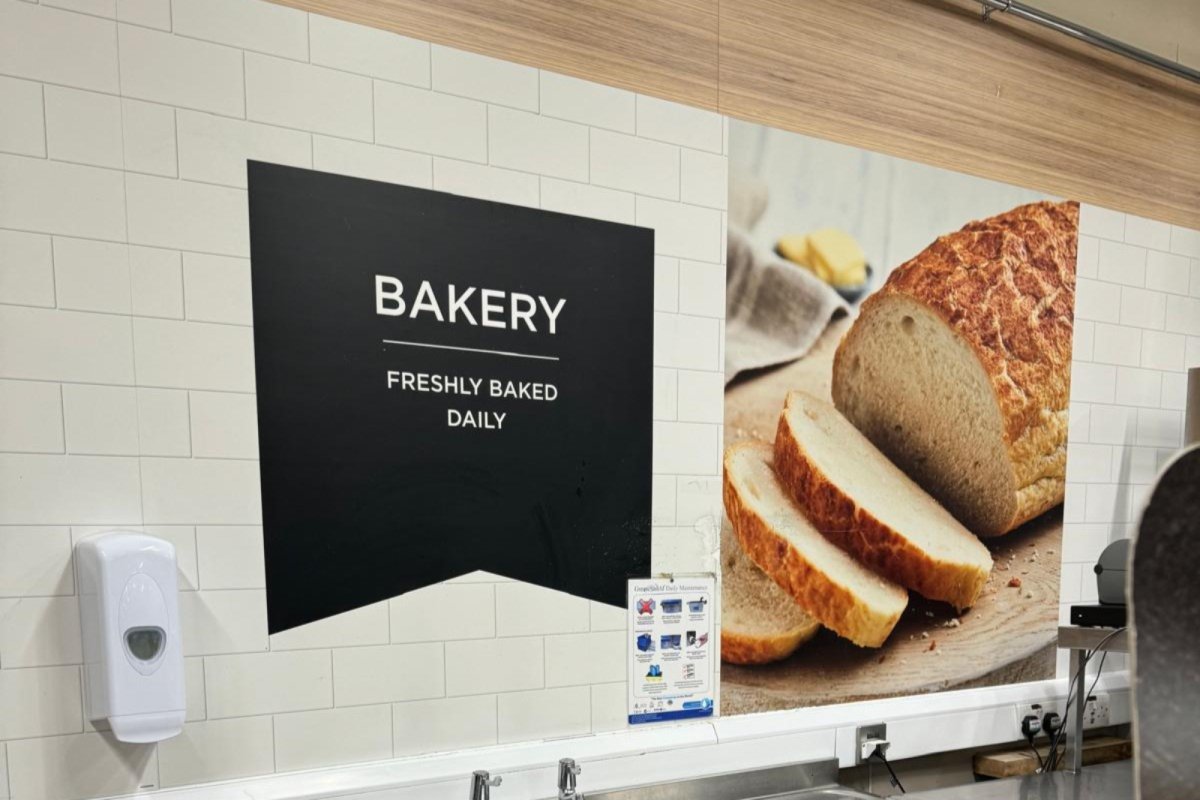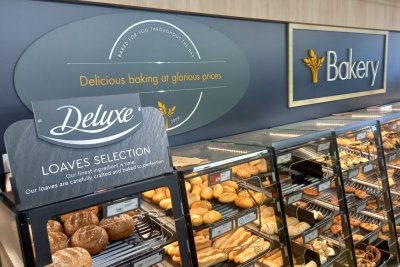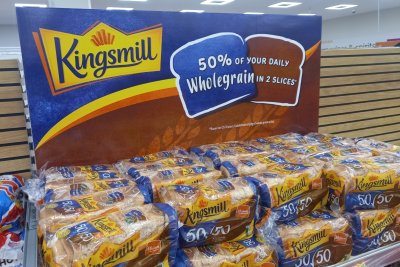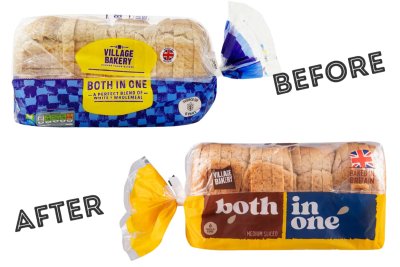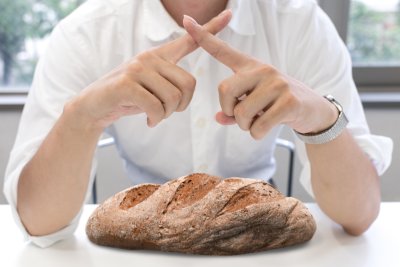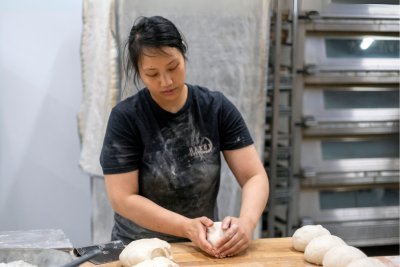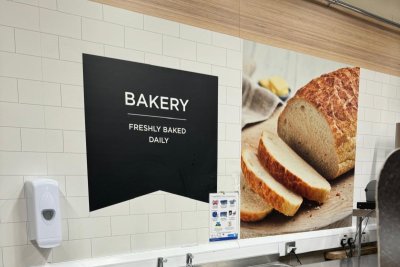 RE-baked daily. Credit: www.realbreadcampaign.org CC-BY-SA-4.0
RE-baked daily. Credit: www.realbreadcampaign.org CC-BY-SA-4.0
Freshly faked by Asda?
The Real Bread Campaign complaint to trading standards.
On 3 July 2024, the Real Bread Campaign submitted a complaint to West Yorkshire Joint Services, which has the Primary Authority relationship with Asda for trading standards.
The Campaign believes that:
- Nothing in the ‘bakery’ section of any Asda store is made from scratch on site.
- No ‘bread’ products are freshly baked in-store: all are manufactured elsewhere and merely re-baked in-store.
- Some products are frozen after manufacture, then re-baked at a later date.
We also question whether, in common with other multiple retailers, one or more of these products are manufactured outside the UK.
Despite the above, Asda markets its ‘bakery’ section products using claims including: ‘baked in store’ and ‘freshly baked daily’. To reinforce these messages, the company displays prefabricated products in paper bags in wicker and wire baskets, as if they were freshly made at a craft/artisan bakery.
This all compounds the company choosing to withhold the above facts from customers, or at least not to declare the full story with equal/any prominence.
The Campaign believes, therefore, Asda’s marketing is misleading and breaches consumer protection regulations.
What this is not
To be clear, this complaint is not that Asda is making cheap products widely available, it is about how the company is marketing them. Dropping, or revising, the claims and merchandising will not affect the price and availability of products, nor will it affect people who shop mainly based on price and/or availability.
Ask Asda
On 25 June 2024, the Campaign emailed these questions to customer.services@asda.co.uk:
- How many stores does Asda operate in the UK?
- How many stores have an 'in-store bakery' section?
- At how many of these stores are all bread products in the 'in-store bakery' made fresh from scratch on site?
- At how many of these stores are all bread products in the 'in-store bakery' made elsewhere and then re-baked in-store?
- At how many of these stores are bread products in the 'in-store bakery' a mix of lines made and baked fresh from scratch on site, and lines made elsewhere and then re-baked in-store?
- Are any products sold in the 'in-store bakery' made outside the UK?
- If so, which ones and where?
- How does Asda make customers aware of these facts?
Asda replied that the email address was no longer in use, with a redirection to an ‘Asda Help Centre’ page. The page didn’t provide answers to any of these questions, or a way of getting them online or by email, so we forwarded them to the CEO’s office.
Having not received any response, we emailed again on 1 July but, as of 3 July 2024, we still had not received any answers.
Re-baked in store
FSA guidance states: ‘Terms such as “freshly baked”, “baked in store” and “oven fresh” may mislead consumers into believing that they are being offered products that have been freshly produced on site from basic raw materials. Some stores sell bread made from part-baked products that have been packed in an inert atmosphere or frozen off-site then “baked off” at in-store bakeries. Use of terms like “freshly baked”, “baked in store” and “oven fresh” on these products could potentially infringe the general legal provisions…’
These provisions include Regulation (EC) No 178/2002, which states that ‘it is a general principle of food law to provide a basis for consumers to make informed choices in relation to food they consume and to prevent any practices that may mislead the consumer.’ More specifically, Regulation (EU) No 1169/2011 on the provision of food information to consumers requires that ‘food information shall not be misleading, particularly: (a) as to the characteristics of the food and, in particular, as to its nature, identity, properties, composition, quantity, durability, country of origin or place of provenance, method of manufacture or production.’
The Campaign understands the truth is that all ‘bread’ products displayed in Asda’s ‘bakery’ section are manufactured at central production units, chilled or frozen, shipped to each store and then loaded into what we call loaf tanning salons - ovens in which they’re merely re-baked to brown and crisp the crust – at a later date. Asda chooses not to declare these facts on product packaging or shelf / in-store displays, which the Campaign believes is misleading by omission.
Asda operates around 1000 stores in the UK. Even back in April 2021, British Baker reported that the company only ran ‘a level of scratch baking’ in around a third of these. The report also noted that Asda had announced it would stop scratch baking in those 341 stores and was entering into formal consultation with 1,200 bakery staff at risk of redundancy as a result of this decision.
A Google search for ‘Asda in-store bakery’ found the company making the claim: ‘Visit the ASDA in store bakery and grab yourself a freshly baked treat. Whatever the occasion, there's yummy fresh bread…’ When we visited an Asda store in Lewisham in June 2024, beside a sign on the wall that pictured a loaf and claimed: ‘freshly baked daily’, we saw racks of pre-baked loaves waiting to be loaded into ovens to be re-baked. On the front of one of these bake-off ovens was an A4 sheet of re-baking program settings: 1 = rolls, 5 = loaves, etc. A member of staff confirmed that they made and baked nothing fresh from scratch in store, instead merely loading frozen, prefabricated loaves into the oven and selecting the appropriate re-bake setting. The staff member commented that it was a shame that there were no bakers making bread any more at Asda, and that when they bought fresh bread they’d want it to really be fresh bread.
Around three years after Asda ended scratch baking in its stores, the company still markets its ‘bakery’ products using claims including: ‘baked in store’ and ‘freshly baked daily’ These are likely to leave or lead the average consumer to understand that bread is made in-store on the day it is sold, which the Campaign believes breaches the regulations.
Facts frozen out
Regulation (EC) No 178/2002 requires that: ‘The name of the food shall include or be accompanied by particulars as to the physical condition of the food or the specific treatment which it has undergone (for example, powdered, refrozen, freeze-dried, quick-frozen, concentrated, smoked) in all cases where omission of such information could mislead the purchaser.’
As noted above, Asda sells products that were manufactured and frozen at one or more central production units, then transported to and merely re-baked in Asda stores. According to one former Asda baker’s testimony: ‘some products that came pre-packaged and labelled [so our role was] simply just defrosting them’. The Campaign believes that doing this without declaring at point of sale (or on the company website) that this has taken place breaches this regulation. The Campaign further believes it breaches section 6 of The Consumer Protection from Unfair Trading Regulations 2008 on misleading omissions, in that ‘the commercial practice omits material information’, which Asda compounds by stating that such products are ‘baked in store’ and ‘freshly baked daily’.
Shoppers have the right to know if a product has been re-baked as the process uses around twice as much energy as baking a product once and so can have a negative environmental impact. Re-baking also has a negative impact on the quality of a product in that it is likely to stale more quickly than genuinely fresh bread that has only been baked once. This has potential for negative environmental impact as it increases the likelihood of food waste in the home, at a financial cost to the shopper.
Another factor is the local negative socio-economic impact. Unlike scratch baking (ie making from basic ingredients) in a store, a bake-off system requires low levels of skill and relatively little staff time. In other words, it makes skilled baker roles redundant in that store, while still competing with local bakeries that provide skilled jobs, which we believe offer greater job satisfaction.
Misleading merchandising?
Article 16 of Regulation (EC) No 178/2002 requires that the: ‘presentation of food or feed, including their shape, appearance or packaging, the packaging materials used, the manner in which they are arranged and the setting in which they are displayed, and the information which is made available about them through whatever medium, shall not mislead consumers.’
Asda displays ‘bakery’ products in wicker and wire baskets, with some in paper bags. Being of the type you often find in local bakeries, this merchandising is markedly different from the painted metal shelves used in the rest of the store.
The Campaign believes that Asda presenting prefabricated factory products as if freshly made in an artisan bakery breaches the regulation, particularly as these physical and visual cues reinforces - and are reinforced by – the ‘baked in store’, ‘freshly baked daily’ claims, in a mutually-amplifying echo chamber.
Unfair competition?
As previously noted, in order to benefit from the economy of scale of centralised manufacture, Asda has closed in-store scratch bakeries and so made many skilled bakery roles redundant. This, combined with being able to profit from thousands of high-margin, non-bakery items, allows the company to sell ‘in-store bakery’ products at low lower prices than small artisan bakeries can. The company, however, still markets mass-produced, re-baked items using claims and merchandising that will lead the average consumer to understand that the products have been freshly made from scratch on site by skilled bakers, as they are in small bakeries and as some shoppers will remember Asda stores doing.
In some cases, the prefabricated products are sold at premium prices. For example, in June 2024 we found a 400g ‘Asda Extra Special Parisien Pave’ priced at £2.05, the equivalent of £4.10 for an 800g loaf. We see this as pulling a cynical stunt of undercutting the typical price of a loaf hand-crafted (at a much, much smaller scale) by a local bakery, while simultaneously being more ‘reassuringly expensive’ than other mass-produced loaves Asda sells. Combined with the written claims and merchandising, the pricing helps Asda to promise: ‘we’re offering you a premium, artisan bakery product at a bargain price.’
The Campaign believes that Asda’s marketing represents unfair competition with these small, independent businesses that create skilled, meaningful jobs, and help to keep money circulating in local economies.
A long time ago in a factory far, far away
Regulation (EU) No 1169/2011 requires that: ‘The indication of the country of origin or of the place of provenance of a food should be provided whenever its absence is likely to mislead consumers as to the true country of origin or place of provenance of that product.’ The regulation goes on to state: ‘In all cases, the indication of country of origin or place of provenance should be provided in a manner which does not deceive the consumer and on the basis of clearly defined criteria which ensure a level playing field for industry and improve consumers’ understanding of the information related to the country of origin or place of provenance of a food.’
The Campaign understands that some bake-off products sold by other supermarket chains are made outside the UK, but this important fact is not always declared on labels or point of sale displays. As noted above, Asda did not answer our question on this subject.
If Asda is indeed selling products that were manufactured outside the UK, without disclosing their true origins, the Campaign believes the company is depriving shoppers of important information that further contributes to unfair competition with bakeries that make bread fresh from scratch in the UK. If Asda is misleading customers by omission in this way, the Campaign believes that the company’s claims and merchandising serve to reinforce the breach of regulations by stating and implying an alternative time, place and means of production.
See also
- Help us expose The (not so great) British Fake Off
- Freshly faked
- An Honest Crust Act: Updating and improving the Bread and Flour Regulations
- Are Supermarket Bloomers (Still) Pants?
Updates
WYJS = West Yorkshire Joint Services, which has the Primary Authority relationship with Asda for trading standards.
16 April 2025: WYJS replied: 'I will discuss this with Asda.'
14 April 2025: Despite the assurance from Asda that WYJS forwarded to the Campaign on 21 October 2024, we found that Asda is still using the claims ‘baked in store’ and ‘freshly baked in store’ to market loaves etc. that were manufactured at some unspecified location on an unspecified date in the past. We passed the latest evidence to WYJS, asking the trading standards officers to advise what action they will be taking to ensure Asda removes all such and similar claims, and a timescale for the company doing so.
4 March 2025: WYJS replied: 'I have read through the correspondence and considered the legislation to which you refer. With regard to your allegation that Asda is breaching consumer protection legislation by omitting to declare that bread is not made from scratch on site but brought in and baked off in store, I came to the same conclusion that [my colleague] did, that there has been no breach of the applicable legislation.
With regard to the second part of your complaint concerning the claims to which you refer ‘Visit the ASDA in store bakery and grab yourself a freshly baked treat.’ And ,‘There's nothing better than freshly baked goods and our bakery is full of delicious breads, cakes and crumpets you and your family will love.’ I have today done an internet search myself and did find these. It appears that they only appear in the meta tag description for the Asda website rather than within the content of the website itself. We have raised this with Asda to address. As [my colleague] informed you previously Asda have removed all claims of freshly made/freshly baked for bread in stores apart from pancakes which are still made in stores. Other than following up the meta tag description we do not intent [sic.] to take this matter any further.'
3 March 2025: We asked WYJS to confirm they had received our review request and to advise a timescale for the process.
18 February 2025: We asked WYJS to review the case.
7 February 2025: WYJS responded: 'We will not be taking any further action.' We asked for details of the organisation's review process.
5 February 2025: We again asked WYJS for a reply to the email we sent on 21 October 2024.
18 November 2024: We asked WYJS for a reply to the email we sent on 21 October 2024.
21 October 2024: WYJS wrote: 'Asda have made me aware that there are no claims of freshly made/freshly baked for bread in stores apart from pancakes which is made in stores with a hot plate installed. In regards to the image attached in your initial email I have been told it should have been removed by the store several years ago, it appears to be in the back of house bakery area which may explain why it was missed. If you come across any further signage please let me know.'
We replied: "Thank you for this update. We will notify you if we become aware of Asda continuing / starting to use claims that state or imply that products in ‘The Bakery’ are made on site.
Please advise where you up to with the rest of our complaint, regarding:
- Omission of material information about how, where and when products in its ‘The Bakery’ section are actually manufactured, in apparent breach of Regulation (EU) No 1169/2011.
- Merchandising that appears to breach Article 16 of Regulation (EC) No 178/2002"
23 August 2024: WYJS replied: 'I have asked Asda for an update, I will be in touch in due course.'
22 August 2024: We asked WYJS for an update on their investigation and an ETA of a full reply.
8 July 2024: West Yorkshire Joint Services responded: 'I will discuss the points mentioned with Asda head office.'
Real Bread Campaign: Finding and sharing ways to make bread better for us, our communities and planet.
Sustain
The Green House
244-254 Cambridge Heath Road
London E2 9DA
020 3559 6777
sustain@sustainweb.org
Sustain advocates food and agriculture policies and practices that enhance the health and welfare of people and animals, improve the working and living environment, promote equity and enrich society and culture.
© Sustain 2025
Registered charity (no. 1018643)
Data privacy & cookies
Icons by Icons8
